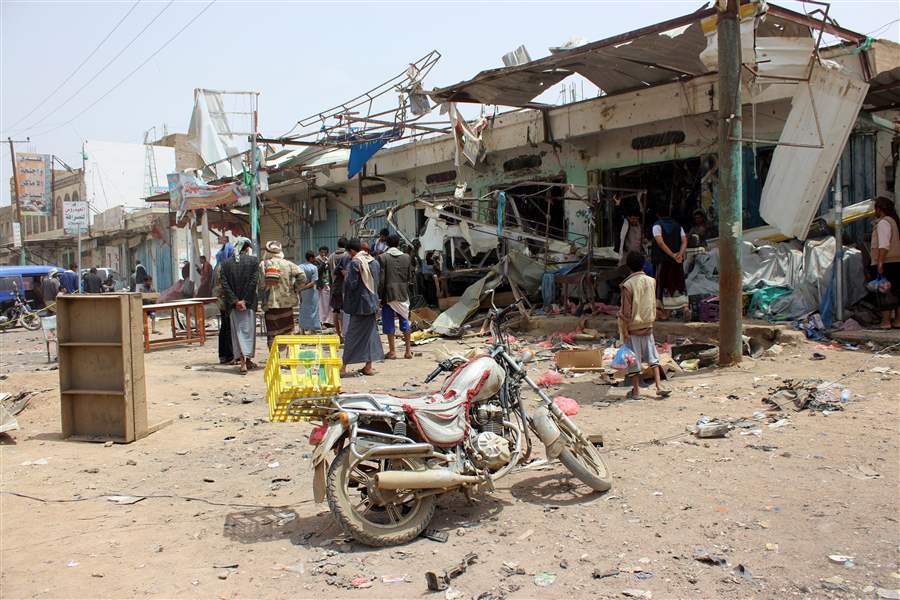
Why does the U.S. continue to support war crimes in Yemen?
9/10/2018
Yemenis gather next to the site of a Saudi-led coalition air strike that targeted the Dahyan market. Forty children were killed in the attack, which used U.S.-supplied armaments.
AFP/Getty Images

Will Tomer
The ongoing crisis in Yemen, the result of a Saudi Arabia-led intervention heavily funded and supported by the U.S. government, has resulted in at least 8,500 civilian deaths and endangered the lives of millions more. So pronounced is the crisis that American lawmakers are finally asking why and to what extent the U.S. is involved.
Last month, a Saudi airstrike killed at least 48 people, 40 of whom were under the age of 15, in the small Yemeni town of Dahyan. The children had been traveling in a bus through Dahyan’s central market when the bomb was dropped. Photos taken at the scene allowed investigators to determine that the bomb used had been produced by U.S. manufacturer Lockheed Martin and had been sold to Saudi Arabia by the U.S. government.
After the incident garnered international attention, Sen. Elizabeth Warren (D., Mass.) sent a letter to Gen. Joseph Votel, head of U.S. Central Command, asking that he expand upon his previous congressional testimony about the U.S. government’s role in the conflict in Yemen in which he downplayed U.S involvement.
In her letter, Ms. Warren highlighted that the U.S. government, which has supported the Saudis’ endeavor in Yemen since it began in 2015, has sold the Saudis hundreds of millions of dollars in arms, refueled Saudi planes, offered intelligence about potential bombing targets, and participated in a blockade that has left more than 22 million Yemeni without access to food, water, or health care.
The conflict in Yemen is widely regarded as a proxy war between Saudi Arabia and Iran. Iranian-backed Houthi rebels took over Yemen in 2015 when they forced the resignation of Saudi-backed President Abdrabbuh Mansour Hadi. Since that time, Saudi Arabia has attempted to regain control of the country by force, with a great deal of assistance from the U.S. government. In fact, U.S. involvement in the conflict is so vital that many analysts believe the violence would stop as soon as the U.S. withdrew support.
Various legislators and officials within the U.S. government have acknowledged the severity of the situation. After the Dahyan bombing, Defense Secretary James Mattis said that U.S. support for Saudi Arabia’s intervention was “not unconditional” and said they should “do everything humanly possible to avoid any innocent loss of life."
In February of this year, a bipartisan coalition of U.S. Senators — led by Sens. Bernie Sanders (I., Vt.), Mike Lee (R., Utah), and Chris Murphy (D., Conn.) — introduced a resolution to end U.S. military support for the conflict in Yemen. “This is one of the great humanitarian disasters of our time,” Sen. Sanders told Vox at the time. The resolution was killed in May by a margin of 55-44, with the voting falling largely along party lines.
Another congressional effort, led by Rep. Ro Khanna (D., Calif.), seeks to withdraw U.S. support from Yemen crisis by invoking the War Powers Act of 1973, which asserted Congress’ ability to authorize U.S. military operations. It is unclear how much support there is for Mr. Khanna’s resolution.
As the situation in Yemen has continued to deteriorate, the Saudi-led coalition has made more troubling decisions. For instance, an Associated Press report last month revealed that the coalition had paid al-Qaeda militants — in both cash and weapons — to join the fight against the Iranian-supported rebels. The coalition’s Joint Incidents Assessment Team has also been criticized by Human Rights Watch for failing “to provide credible, impartial, and transparent investigations into alleged coalition laws-of-war violations.”
In a related vein, the United Nations recently published a report accusing Saudi Arabia and United Arab Emirates of war crimes. The report alleged the Saudi and UAE militaries have killed thousands of innocent people in airstrikes, tortured detainees, rapedcivilians, and used child soldiers.
Is this the kind of behavior the U.S. feels comfortable supporting? Should the dollars of taxpayers be used to support a devastating conflict in a country with which the U.S. is not at war?
The bombing in Dahyan was a tragedy that has motivated lawmakers such as Ms. Warren to ask again why the U.S. government is supporting and even manufacturing this crisis.
The American people should vigorously question their congressional representatives about the situation in Yemen. Why does the U.S. compromise its commitments to human rights by supporting a coalition that has been accused of war crimes and is aligned with terrorist organizations? Why is the U.S. military supporting a conflict abroad without explicit congressional approval? Why is there so little debate within Congress about funding this and similar policies at a time when there are continuing calls to increase funding for pressing domestic needs such as health care and education?
The U.S. government should not lend its support to a military campaign that indiscriminately targets civilians. The Yemeni people have suffered for nearly three-and-a-half years and will continue to suffer as long as this conflict continues. The U.S. should withdraw its support for the proxy war in Yemen now and begin working immediately to alleviate the suffering of the Yemeni people.
Contact Will Tomer at wtomer@theblade.com, 419-724-6404, or on Twitter @WillTomer.